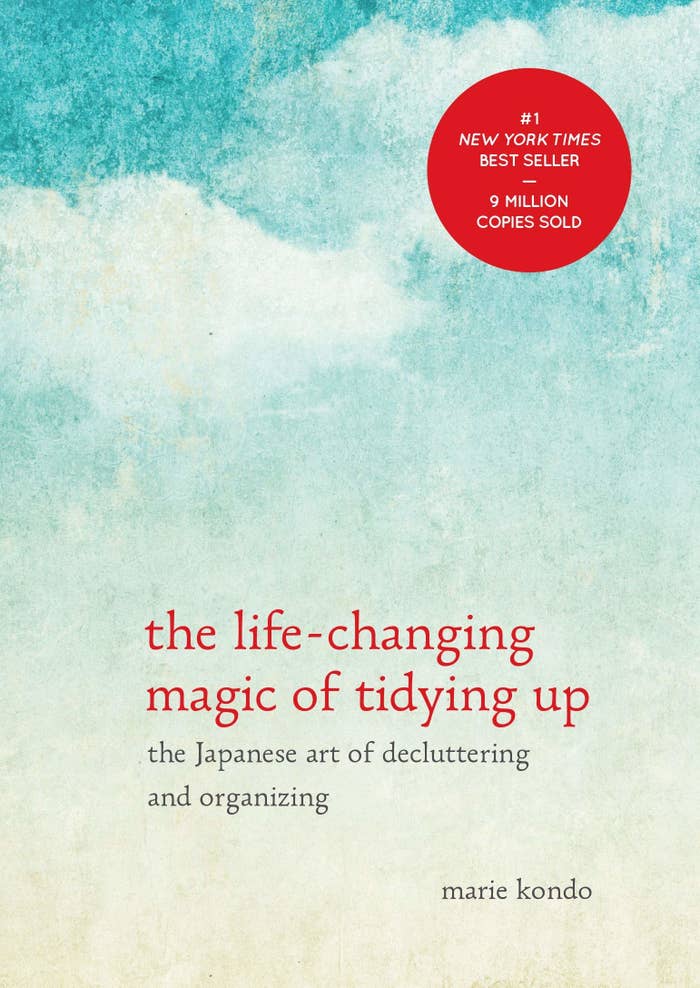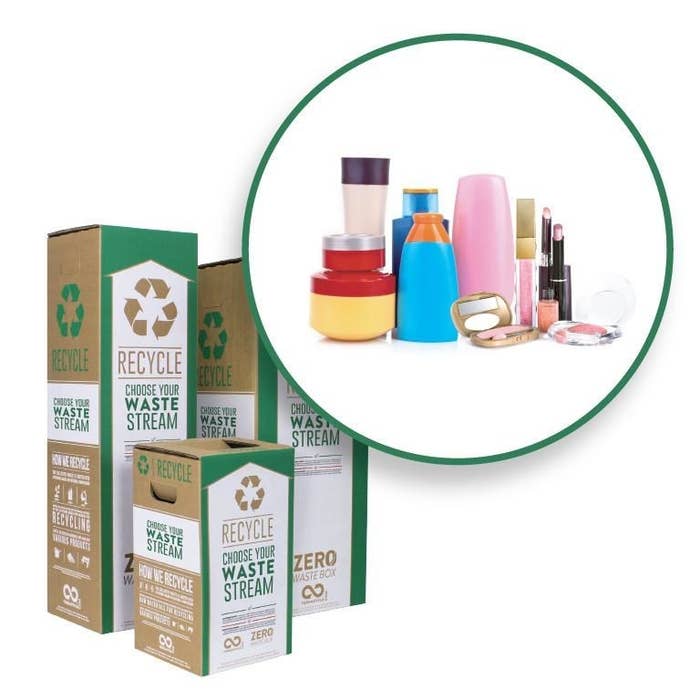Netflix and chill? After a single episode of
Tidying Up With Marie Kondo, you will not feel chill. It doesn’t induce quite the same anxiety as, say, an episode of
Hoarders, but you’re more than likely to find yourself mentally taking stock of your bookshelves, junk drawers, medicine cabinet, and, most intensely (for us, at least), closet. You might feel a sudden urge to throw your wardrobe in a pile on the floor (this step is crucial to Kondo’s method), pick up each garment one by one, and ask yourself if it “sparks joy.” Next, you’ll stuff the rejects in a dozen trash bags (did I say a dozen? I meant two or three . . . I don’t have a problem . . . ) and send them off to your local donation center. Not only will you feel lighter, but you’ll never think about that stuff again—out of sight, out of mind!
For many of us, cleaning out our closet factors into “spring cleaning” and other responsible adult rituals. For others, it’s an enormous chore that we put off, and put off, until inspiration strikes—most recently in the form of Kondo’s TV show (or book, if you were an early disciple). She’s single-handedly launched a “tidying up” movement: Goodwill, the Salvation Army, and other donation centers have received a record number of unwanted clothes in these first weeks of 2019. In fact, on the
Today show this morning, Hoda Kotb and Jenna Bush Hager discussed the trend, focusing on what many of us have perceived as its charitable, altruistic results. The more donations, the better, right? Not always. We’re certainly not going to discourage you from donating, but we’ve recently learned that only a fraction of donations end up on the sales floor. The rest are often shipped to India or Africa, places that actually
don’t need more of our cast-offs; there are literally
mountains of clothes sitting there without a purpose.
Anything is better than just throwing your clothes away, of course, particularly if they’re made from synthetic fibers that won’t decompose in a landfill. But before you haul everything to a donation center, consider a few other ways to clean out your closet—and even make some extra cash.
Sell your stuff!
Donation centers aren’t the only places receiving record amounts of unwanted clothes. Secondhand shops like Beacon’s Closet
are busier than ever, too.
ThredUp, “the world’s largest online thrift store,” reported a 50 percent increase to site traffic since January 1, the day Kondo’s show premiered. On top of that, requests for ThredUp’s clean-out kits (which you fill with clothes and ship to their HQ to be sold online) increased by a whopping 70 percent in the first week of January. Since then, the number of daily bag requests has consistently been 57 percent higher than average.
ThredUp makes it crazy-easy to unload your stuff and make some cash—just fill up their clean-out kit, set up a mail pickup, and they handle the rest. Whatever they don’t take gets “reused or responsibly recycled.” Or you can take secondhand sales into your own hands through apps like Depop, Poshmark, Tradesy, and eBay—and if you have luxury items, you can easily ship them to The RealReal, Vestiaire Collective, and Rebag (which send back the items they won’t accept).
Organize a swap meet.
Back in 2017, designers Cary Vaughan and Jenna Wilson launched a global,
virtual swap meet on Black Friday to combat the holiday’s message of frenzied, more-is-more consumerism. The fact that more designers haven’t followed their lead is surprising. If you have stuff you no longer want but can’t (or don’t want to) sell, chances are it will feel brand new to your friends, and vice versa. Not only does swapping extend the lifespan of your garments, but it reduces the need to go out and buy a bunch of brand-new clothing, too. Maybe you’ll end up partially filling all of that space you created in your closet—but at least it will be with items that already existed.
Repair or upcycle the pieces you’ve damaged or fallen out of love with.
Chalk it up to “millennial fatigue,” but the idea of getting to a tailor to have something altered or repaired sounds like an impossible task. Consider the pair of too-long lavender trousers in my closet . . . which I bought almost a year ago. Is there a tailor one block away from my apartment? Yes. Have I walked the 12 steps it would take to get in the door? Absolutely not. I’m vowing to finally do it this season (and will get the buttons reinforced on my vintage suede jacket, too). If you have stuff that’s damaged, or even stuff that’s perfectly fine that you no longer wear, you can have it tweaked (or turned into something else entirely) with
Atelier & Repairs. Founder Maurizio Donadi launched A&P after working in the fashion industry for 35 years, where he witnessed a vast amount of textile waste and overproduction. Instead of creating new garments, he and his team upcycle and transform “forgotten” pieces into new, one-of-a-kind items that are exponentially more interesting. If you (like me) have a stockpile of unworn denim, he’s doing a pop-up installation at
180 the Store on January 31 to customize and “give a second life” to once-loved jeans.
Recycle the stuff you can’t sell or upcycle.
By now, most of us know plastic, cardboard, glass, and other recyclable materials don’t belong in a landfill. But even your most “woke” friends likely aren’t recycling their textiles, at least not the right way. What do you do with old towels, sheets, underwear, and worn-out T-shirts, anyway? Throw it in the dumpster? Not quite. There are tons of ways to recycle textiles: New Yorkers can take their stuff to
Green Tree, which partners with farmers’ markets throughout Manhattan and Brooklyn;
TerraCycle will send you a zero-waste box to fill up; and stores like & Other Stories and Madewell will give you a discount on your purchase if you bring in clothes or jeans to recycle, respectively. Textiles are often recycled to create housing insulation, but they can also be
spun into new fibers for designers to use.
It’s a lot easier to recycle natural textiles—cotton, linen, wool, et al.—of course. Polyester is often very difficult, if not impossible, to recycle into new yarns, and fabrics made from a cocktail of synthetics are off the table, too. In the future, ideally all clothes would be at least partially recyclable, but that will heavily depend on designers and manufacturers. Patagonia already accepts garments to recycle through its Common Threads program, and some of the most luxurious brands in the biz are getting behind the idea, too. Twenty-five percent of Alessandro Sartori’s new
Ermenegildo Zegna collection was made from leftover or deadstock wools, nylons, and cashmeres—and even more impressive, Sartori intends for his clients to bring those garments back to Zegna to be recycled again in the future.
Donate the rest.
Clothes that you can’t or won’t sell, swap, repair, or upcycle should be donated (but only if they’re in decent condition). There are major nonprofit organizations like Goodwill and the Salvation Army, which will accept your heaping bags of clothing, shoes, accessories, and home goods. But before you gather everything in a pile, consider if some of those pieces might be suited to a particular charity: If it’s a nice dress, blazer, or blouse, take it to
Dress for Success. Cocktail and bridesmaid dresses should go to Becca’s Closet or Operation Prom, which both provide prom dresses to high school girls in need, and you can donate shoes to adults and children in need around the world with
Soles4Souls.

 I mean yes, you can also totally watch the Netflix show an learn everything you need to know to get started! But the book's packed with extra motivation and tips. (Although I don't think it's the end-all be-all of how to live, I've used her system for my clothes and shoes, and it really does work.)
Promising review: "It's soaked with knowledge and super inspiring! As a chronically messy person, this book completely changed my perspective on 'tidying,' what to throw away or get rid of, and how to find joy in your space again, how to reclaim it! Honestly pretty awakening, and I think absolutely everyone could learn something from it." —
I mean yes, you can also totally watch the Netflix show an learn everything you need to know to get started! But the book's packed with extra motivation and tips. (Although I don't think it's the end-all be-all of how to live, I've used her system for my clothes and shoes, and it really does work.)
Promising review: "It's soaked with knowledge and super inspiring! As a chronically messy person, this book completely changed my perspective on 'tidying,' what to throw away or get rid of, and how to find joy in your space again, how to reclaim it! Honestly pretty awakening, and I think absolutely everyone could learn something from it." — Yes, basically you're paying for your stuff to be recycled (the reason your curbside collection doesn't take all of the things = recyclers want to
Yes, basically you're paying for your stuff to be recycled (the reason your curbside collection doesn't take all of the things = recyclers want to